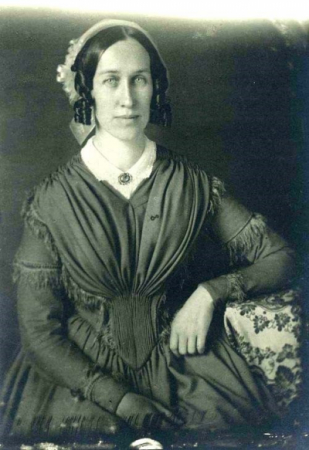Clarina Nichols - Abolitionist and Women's Rights and temperance advocate
By Bernadette Cahill
On October 15, 1851, Clarina Nichols – abolitionist and women’s rights and temperance advocate – told an audience of a thousand the harrowing tale of a woman who had worked hard all her life and married in her mature years a good but poor man with adult children.
The couple lived well even after the husband became an invalid, for the wife had her lifelong savings and continued to make a living after marriage. When he died, her life changed. The law decreed that on marriage, all of a woman’s property and earnings became her husband’s. It also dictated that when he died she received only a life interest in one-third of their property; his children received the rest, plus the remainder on her death. Without working, she was effectively penniless.
“One day, she was found in her bed paralyzed; and never to the day of her death … could she lift her hand or make known the simplest wants … [The law] set her up at auction and struck her off to the man who had a heart to keep her at the cheapest rate. Three years she enjoyed the pauper’s support, then died, and … [her] third was divided … among her husband’s ‘well-to-do’ children.”[1]
This first public speech by Clarina Nichols on women’s rights shocked the crowd gathered in Worcester, Massachusetts for the second National Woman’s Rights Convention – held just over three years after the first Woman’s Rights meeting of July 1848 at Seneca Falls, New York. Thus, during her second attendance at a national meeting, the 41-year-old journalist from Brattleboro, Vermont exposed the fact that in the United States all men may have been created equal, but “men” actually meant males only: women under the law were slaves by another name.
Her story demonstrated not just the inequality of women under the law, but specifically married women’s lack of control over their own money. Unmarried women, if not as overtly constrained by the law, faced harshly unequal pay, few work opportunities and families that insisted on daughters being in their service for life.
The story of the paralyzed widow symbolized a wider reality. While U.S. women from 1848 were overtly fighting to improve their legal position, they were locked in a straitjacket: without the vote, they had no way to amend the laws, taxes and penalties imposed on them without their consent; without money, they had no means to campaign for reform. When Francis Jackson of Boston created a trust for women’s rights work in 1858, therefore, he addressed a crucial need. The main trustee was abolitionist Wendell Phillips. Susan B. Anthony and Lucy Stone were co-trustees.
Meanwhile, in 1854 Nichols had moved to Kansas. She felt she could influence the men there to treat women better in the new code of laws in the new state than the men in old states had ever done. By 1859 two Kansas constitutions had failed in Congress and a third constitutional convention was called. Nichols intended to make sure that this one took women properly into account.
She planned to circulate a petition for the convention asking for equality for mothers with fathers in divorce; the right to own, control, inherit and bequeath property even if married; equality in education; and the right to vote. Nichols was working alone, but another group called the Moneka Women’s Rights Association also planned a campaign for just laws for women. Soon a member of that group, Susan Wattles, and Nichols made contact and the two co-operated to collect signatures and publicize the cause.
Now a widow and struggling financially, Nichols had no money to campaign with. But she and Wattles had read in a newspaper that Wendell Phillips had funds available for women’s rights work. They wrote to him and he provided the Kansas campaign with $100.
Nichols could now afford to travel to the main Kansas settlements and ultimately collect nearly 600 signatures petitioning the convention for justice for women. Two speakers canvassed citizens for support. In July of 1859, Nichols attended the convention every day and lobbied delegates for equal rights. She also addressed two meetings to advocate women’s rights.
The work was partially successful. The new Constitution included equality for women in divorce, property ownership and education. Female suffrage, however, failed for fear that it would compromise Kansas’ application for statehood. Nichols did win the right of women to vote in school elections.
Even without an equal suffrage victory, however, Nichols’ work broke new ground. Kansas became the 34th State in 1861 with some of the most advanced laws for women in the nation, while her successes in 1859 clearly demonstrated the important role of money in equal rights campaigns – money that was made available by Bostonian Francis Jackson in his will.
Cutlines for Photograph
Clarina I.H. Nichols, (1810-1885) born in Townshend, Vermont, was an abolitionist, temperance and women’s rights advocate and a journalist.
[1]From Mrs. C.I.H. Nichols, “On the Responsibilities of Woman,” Woman’s Rights Tracts No 6, (1853), quoted in Diane Eickhoff, “Revolutionary Heart: The Life of Clarina Nichols and the Pioneering Crusade for Women’s Rights,” (Kansas City, Kansas: Quindaro Press, 2006), 61.



